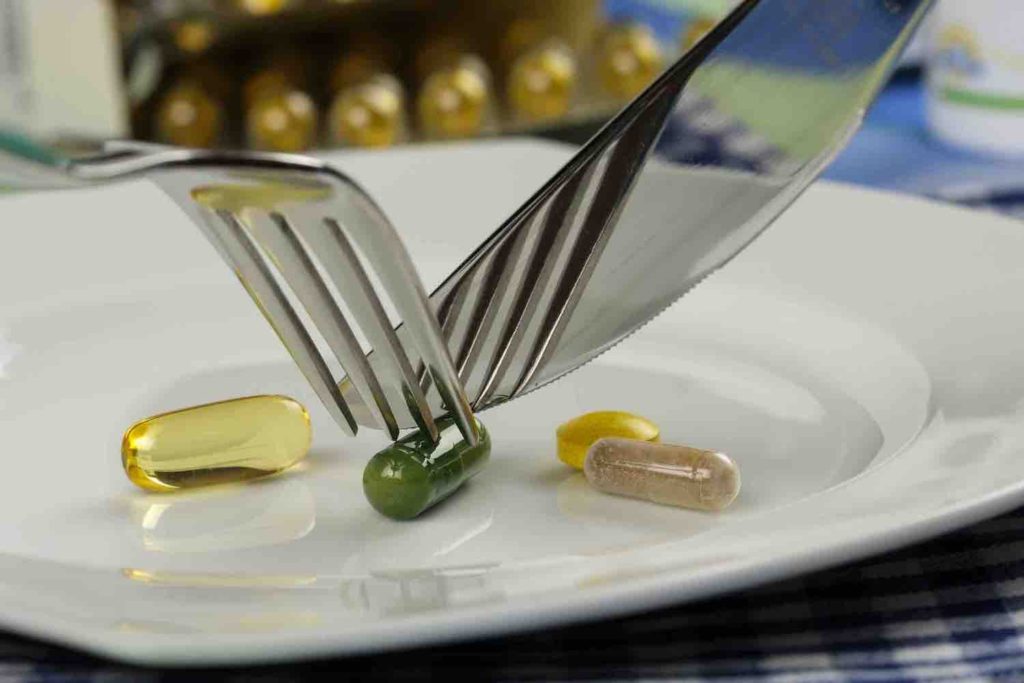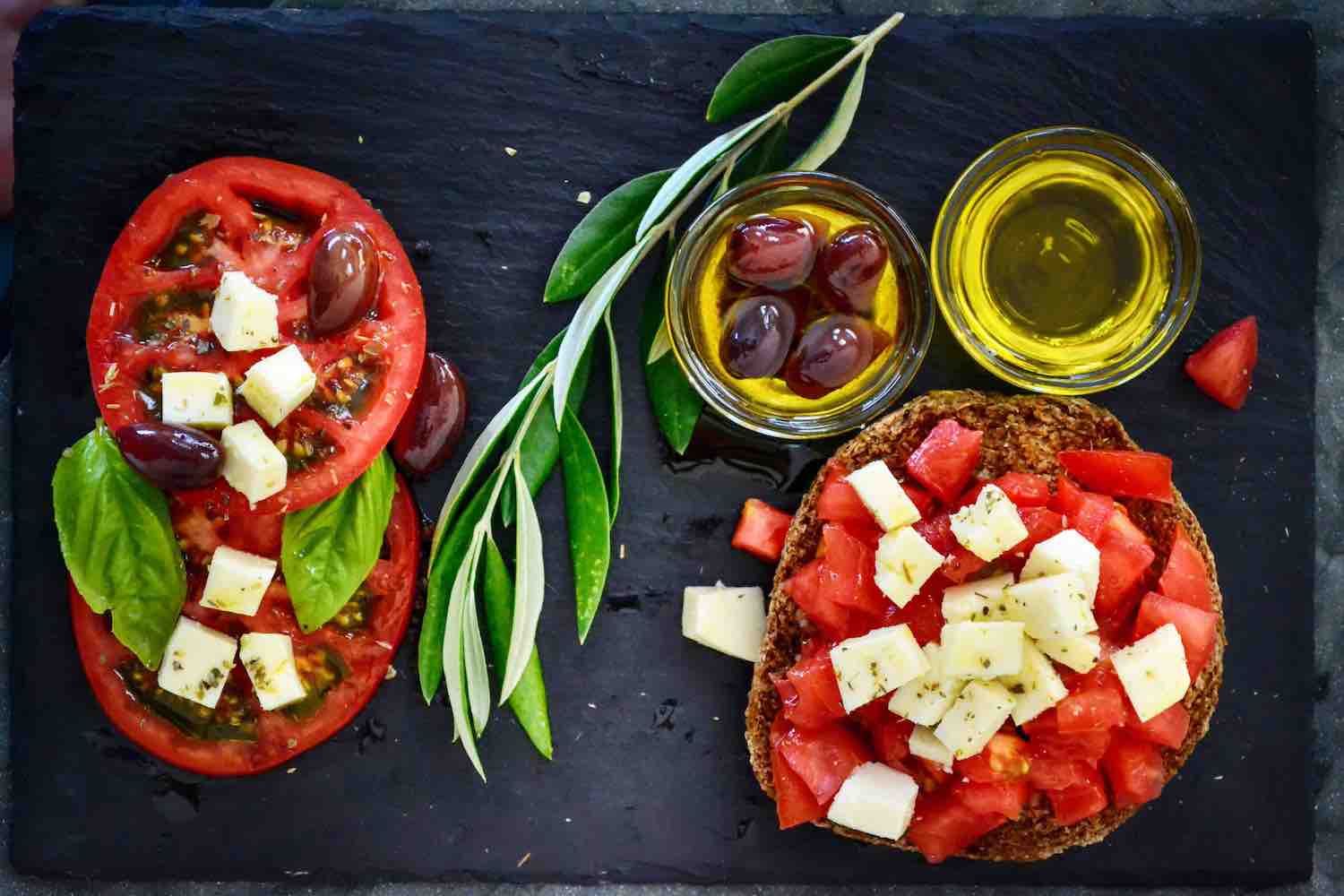As an Amazon Associate, I earn from qualifying purchases.

On Thanksgiving, I awoke feeling grateful that it had rained the day before, clearing the air of the wildfire smoke that had been plaguing the San Francisco area for weeks and liberating the sun from a haze of pollution. For the first time in weeks, I could go outside and make vitamin D from the sun instead of taking a supplement.
As an advocate of food as medicine, I choose to get my nutrients from unprocessed food whenever I can. Likewise, I would rather allow my body to create vitamin D from the sun, when possible, than take a pill.
Deciding between supplements vs. food? Let’s examine a few issues regarding dietary supplement benefits, so you can make an informed decision about what works best for you.
Supplements That Work?
Humans have made great advances in science, but I don’t believe we have come close to figuring out nature yet. In creating supplements, scientists focus on only a select few nutrients from whole foods. Many supplements and drugs that have been developed to approximate nature are less effective, and in some cases, even harmful. There’s a reason why we don't thrive on meal replacement bars as our only source of food—we can't duplicate nature.
For example, natural vitamin E has twice the bioavailability of synthetic. Our bodies only absorb half of the synthetic and eliminate the rest. However, before you become a guinea pig for science, consider whether you prefer to take a pill made from petroleum or eat guacamole.

Dietary Supplements Benefits Lack Nutrient Synergy
Supplements imitate isolated parts of nature’s complex systems—it's like manufacturing a car that doesn’t have brakes or a steering wheel. By comparison, nature packages a whole food to contain a wider offering of complementary nutrients.
Nuts, which are beneficial to cardiovascular health, often include more than one form of vitamin E. In contrast, most vitamin E supplements concentrated on alpha-tocopherol, only one of the eight types of vitamin E that exist. Yet studies that supplemented with synthetic vitamin E have been associated with increased risk of heart disease and stroke, the opposite of the intended effect! Are dietary supplements safe?
In addition to food synergies within a food, there can be synergy between foods. For example, fats help our bodies to better absorb fat-soluble nutrients. Many cultures already figured this out—from the French with vitamin A-packed carrots glazed with butter to lycopene-filled tomatoes with olive oil in the Mediterranean. The nutrient lycopene protects our skin against sun damage. Isn’t nature amazing for tomatoes to thrive in warm climates and be at their peak in the summer, when it’s most sunny?

Excessive Nutrients from Dietary Supplements Safe?
With water-soluble vitamins B and C, when you take more than your body needs, the excess is eliminated as expensive urine. In contrast, fat-soluble vitamins A, D, E, as well as minerals such as iron and zinc, can be toxic at high levels.
Consuming excessive amounts of fat-soluble vitamins from eating produce is not deadly. For illustration, two large carrots have 24,056 IU of vitamin A, which is 482% of the recommended daily allowance (RDA). Yet, it's perfectly safe to eat two carrots a day. The body won’t convert excess beta-carotene into usable vitamin A. However, 24,056 IU from supplements or animal sources such as liver can be toxic because these supply ready-to-use vitamin A.
One exception: a British man died from vitamin A overdose after drinking 10 gallons of carrot juice in 10 days—but that was extreme! Other nutrients have also been found to be toxic in large amounts from supplements, but rarely from whole foods.
Dietary Supplements Regulations
The U.S. Food and Drug Administration’s (FDA) website states: “Federal law does not require dietary supplements to be proven safe to FDA's satisfaction before they are marketed.” “The law does not require the manufacturer or seller to prove to FDA's satisfaction that the claim is accurate or truthful before it appears on the product.” Dietary supplements regulations are such that the FDA usually doesn’t take action against a harmful, adulterated or falsely advertised supplement until after it's in the marketplace.
It took the FDA eight years to ban ephedra. By then, there were over 16,000 documented cases of ill health effects, including deaths. Even after ephedra was finally outlawed, the supplement industry managed to overturn the ban. The U.S. Court of Appeals ultimately upheld the decision to make ephedra illegal.
Not being able to rely on the FDA’s protection means that it’s up to you to determine the risks and make your own decisions about whether dietary supplements are safe.
The Supply Chain

Here’s a biggie—where do the ingredients of your supplements come from? “Made in the U.S.” doesn't necessarily mean that the ingredients are from the U.S.
Would you give the same consideration to something “organic” from China, which is notorious for food fraud—from melamine-tainted baby formula to passing off rat meat as lamb—as you would to “organic” from the Europe?
Suppose a supplement company sources from China, but tests each incoming shipment. Would you feel reassured? The Chinese have no qualms about falsifying paperwork, such as “laundering” counterfeit honey through Asian and European countries.
How far down the rabbit hole do you go? Even if you check everything, the truth is a moving target. Ingredient suppliers change constantly. Companies with questionable ethics acquire wholesome companies. Even scientific recommendations change. At this point, are you overwhelmed by information and admit that ignorance is bliss? Do you blindly trust the recommendations of Google or the supplement clerk at the store?
Rather than play whac-a-mole to keep up with the news, how about stepping away from the supplement game completely? Or only use supplements on a limited basis—such as vitamin D in the winter, vitamin B12 for vegans, prenatal vitamins.
When you cut back on processed food with empty calories, it’s easier to get more of the nutrients you need from food. One cup of kale, for example, provides over 100% of your vitamins A, C, and K for the day!
Instead of investigating whether a supplement works or is going to harm you, how about just enjoying nature’s gifts directly?
Like this post and want to learn more? Find out more about supplements, nutrients and reconnecting with whole foods in my book, Nature's Palette: A Food Journey. (https://amzn.to/3hKH1Fo)
Want to incorporate more whole foods into your diet? I can create a tailor-made eating plan for you, and teach you how to shop intelligently and prepare easy and delicious meals. Schedule a free consultation.

